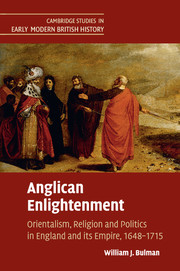Crossref Citations
This Book has been
cited by the following publications. This list is generated based on data provided by Crossref.
2015.
BOOKS RECEIVED.
Church History,
Vol. 84,
Issue. 4,
p.
932.
2016.
Books Received.
The Journal of Ecclesiastical History,
Vol. 67,
Issue. 2,
p.
462.
Hale, Matthew
Raymond, Graham
and
Wright, Catherine
2016.
List of publications on the economic and social history of Great Britain and Ireland published in 2015.
The Economic History Review,
Vol. 69,
Issue. 4,
p.
1309.
Lake, Peter
2017.
Publics and Participation: England, Britain, and Europe in the “Post-Reformation”.
Journal of British Studies,
Vol. 56,
Issue. 4,
p.
836.
Popper, Nicholas
2017.
A Handbook of English Renaissance Literary Studies.
p.
368.
HAIGH, CHRISTOPHER
2018.
The Church of England, the Nonconformists and Reason: Another Restoration Controversy.
The Journal of Ecclesiastical History,
Vol. 69,
Issue. 3,
p.
531.
O'Flaherty, Niall
2018.
Utilitarianism in the Age of Enlightenment.
Poole, William
2018.
A royalist mathematical practitioner in interregnum Oxford: the exploits of Richard Rawlinson (1616–1668).
The Seventeenth Century,
Vol. 33,
Issue. 5,
p.
557.
Goldie, Mark
2018.
John Locke, the early Lockeans, and priestcraft.
Intellectual History Review,
Vol. 28,
Issue. 1,
p.
125.
Mills, R. J. W.
2020.
Religion, scepticism and John Gregory’s therapeutic science of human nature.
History of European Ideas,
Vol. 46,
Issue. 7,
p.
916.
Cahill, Samara Anne
2020.
Anglo‐Muslim relations in 18th‐century literature and culture.
Literature Compass,
Vol. 17,
Issue. 10,
p.
1.
Collins, Jeffrey R.
2020.
In the Shadow of Leviathan.
Orr, Bridget
2020.
British Enlightenment Theatre.
Everdell, William R.
2021.
The Evangelical Counter-Enlightenment.
Vol. 9,
Issue. ,
p.
1.
Pope, Stephanie
2021.
“AnÆgyptiandarknesse”: pagan chronologies,historia sacra, and the hieroglyph in England, 1646-1690.
The Seventeenth Century,
Vol. 36,
Issue. 1,
p.
149.
Tarantino, Giovanni
2021.
The Encyclopedia of Philosophy of Religion.
p.
1.
Levy-Eichel, Mordechai
2021.
“The moral arithmetic”: morality in the age of mathematics.
Intellectual History Review,
Vol. 31,
Issue. 2,
p.
267.
Chatterjee, Jacob Donald
2022.
“Celestial Epicurisme”: John Locke and the Anglican language of pleasure, 1650–1697.
The Seventeenth Century,
Vol. 37,
Issue. 2,
p.
303.
Skjönsberg, Max
2022.
Liberty and religion: Catharine Macaulay and the history of republicanism and the Enlightenment.
Intellectual History Review,
Vol. 32,
Issue. 2,
p.
325.
Brown, Simon
2023.
Making a Trade of Preaching: Clergy, Labor, and Political Economy between the Interregnum and Restoration.
Journal of British Studies,
Vol. 62,
Issue. 3,
p.
662.



